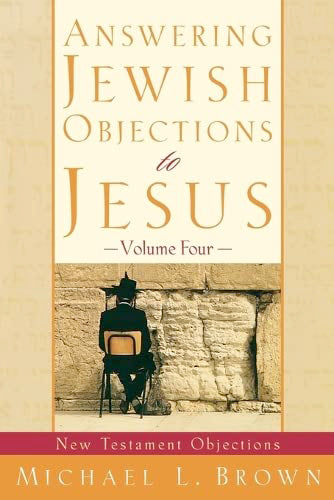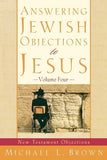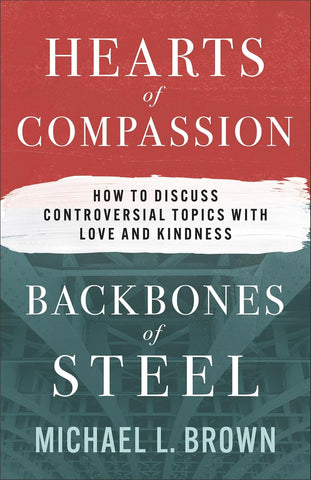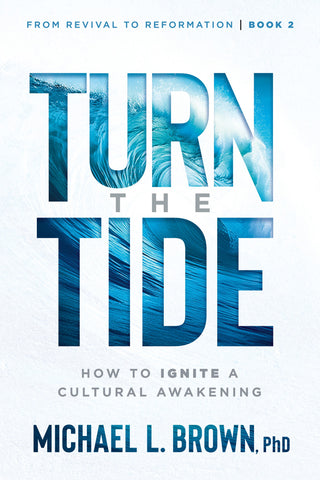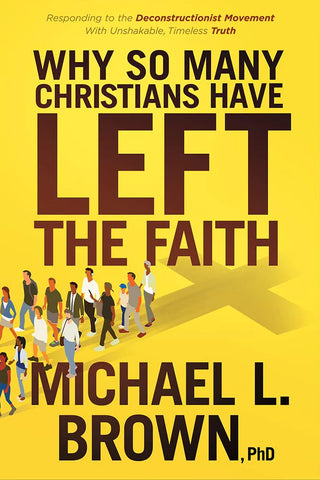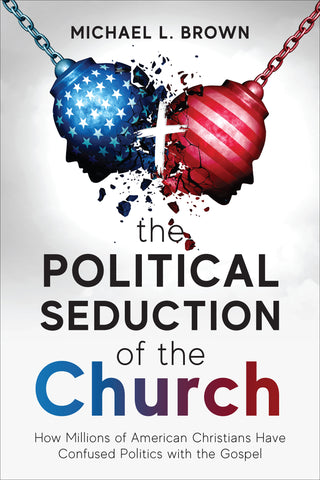Answering Jewish Objections To Jesus - Vol. 4
"The New Testament is full of historical inaccuracies."
"The Gospels portray a mythical Jesus."
"Jesus was a false prophet."
In this volume of the Answering Jewish Objections to Jesus series, Dr. Brown counters the argument that "the New Testament mistranslates, misuses, and misunderstands the Hebrew Scriptures" and also addresses the objection that Jesus or Paul abolished the Law.
He resolves issues such as how the New Testament quotes and interprets the Old Testament, the historical accuracy of the New Testament, apparent contradictions in the Gospels and the rest of the New Testament, pagan influences on Christian teachings, and whether or not Jesus abolished the Torah.
Get answers to misguided accusations and objections like...
- "The New Testament misquotes and misinterprets the Old Testament. At times it manufactures verses to suit its purposes."
- "According to Matthew 2:15, when the little boy Jesus, along with Joseph and Mary, fled to Egypt to escape from Herod, this 'fulfilled what the Lord had said through the prophet: 'Out of Egypt I called my son.' But Matthew only quoted the second half of the verse in Hosea. What the prophet really said was this: 'When Israel was a child, I loved him, and out of Egypt I called my son.' The verse has to do with Israel, not Jesus, and it is recounting a historical event, not giving a prophecy. And you claim that Matthew was inspired. Hardly!"
- "Matthew 2:23 says that when Jesus moved to the town of Nazareth, this 'fulfilled what was said through the prophets: 'He will be called a Nazarene.' There's only one problem. The prophets never said this! Matthew actually made it up."
- "Matthew 27:9-10 is totally confused. First Matthew quotes part of a prophecy from Zechariah, then he says it comes from Jeremiah, and then he takes the whole thing totally out of context. What a mess!"
- "Hebrews 10:5 is one of the worst examples of New Testament Scripture-twisting. The writer quotes from Psalm 40, where the psalmist says, 'You have opened my ears,' and he applies it to Jesus and changes the words to read, 'A body you have prepared for me.' Could you imagine anything more dishonest?"
- "The New Testament is full of historical inaccuracies. None of the important historical writers of the period - Roman or Jewish - make mention of Jesus. It's questionable whether he even existed."
- "Modern scholars are in complete agreement that the Gospels portray a mythical Jesus. There is very little that we can really know about his life."
- "Jesus was not born of a virgin. In fact, we have traditions that actually tell us who Jesus' real father was - and it wasn't Joseph! Anyway, the idea of a god being born to a virgin is just one of several pagan myths that made its way into the New Testament."
- "The genealogies of Jesus given by Matthew and Luke are hopelessly contradictory."
- "The Messiah is David's son. If Jesus were really born of a virgin, then Joseph was not his father and he is really not a descendant of David, even according to Matthew's genealogy. And if you claim that Luke's genealogy is that of Mary, Jesus still doesn't qualify, since the genealogy in Luke goes through David's son Nathan, whereas the Messianic promises must go through David's son Solomon. Therefore, Jesus cannot be the Messiah."
- "Jesus cannot be the Messiah because he is a descendant of King Jehoiachin. God cursed both this king and his offspring, saying that none of his descendants would ever sit on the throne of David."
- "Jesus did work some miracles, but they were not by God's power. We have traditions that tell us he learned magical arts in Egypt."
- "Jesus didn't fulfill any of the Messianic prophecies. We know that the New Testament writers actually reconstructed the life of Jesus so as to harmonize it with certain predictions made by the prophets."
- "When Jesus failed to fulfill the prophecies, his followers invented the myth of his substitutionary death, his resurrection, and finally, his second coming, which, of course, they completely expected in his lifetime."
- "Do you want irrefutable proof that the authors of the New Testament didn’t know what they were talking about? Well, look at Matthew 23:35, where Jesus states that the last martyr spoken of in the Hebrew Scriptures was Zechariah son of Berechiah. Actually that was the name of the biblical prophet (see Zech 1:1); the last martyr was Zechariah son of Jehoiada (see 2 Chron. 24:20-22). So, either Jesus, your alleged Messiah, didn't know his Bible, or else Matthew (or the final editor of his book) didn’t know the Tanakh. Either way this is a glaring error that cannot be ignored."
- "The New Testament is self-contradictory (especially the Gospels)!"
- "Matthew claims that when Jesus died on the cross. 'the tombs broke open and the bodies of many holy people who had died were raised to life. They came out of the tombs, and after Jesus' resurrection they went into the holy city and appeared to many people' (Matt. 27:52-53). This is obviously complete nonsense, without any hint of historical support. If such an incredible event ever took place something like 'the night of the living dead' in ancient Jerusalem-someone would have recorded it."
- "The teachings of Jesus are impossible, dangerous, and un-Jewish ('Hate your mother and father,' 'Let the dead bury their own dead,' 'Give to whoever asks you,' etc.). There's no way he should be followed."
- "The New Testament is anti-Semitic. It is filled with negative references to the Jewish people, and it blames them for the death of Jesus."
- "The Jesus of the New Testament is hardly Jewish. In fact, he even refers to the Torah as 'Your Law'-precisely because it was not his own."
- "Jesus was a false prophet. He claimed that his apostles would live to see his return, a prediction he missed by two thousand years. He also predicted that not one stone in Jerusalem would be left standing when the Romans destroyed it. Well, have you ever heard of the Wailing Wall?"
- "Jesus was a cruel and undisciplined man. He violated the Torah by cursing and hence, destroying a perfectly good fig tree for not bearing figs even though the New Testament writers tell us that it was not the time for figs. So much for your wonderful Messiah! He even called a Gentile woman a dog when she approached him for help."
- "Actually, Jesus also taught that salvation came through obeying the Law. Just read Matthew 5:17-20; 7:21; 19:16-30; 25:31-46. This whole 'gospel of grace' message is the invention of Paul and the other writers."
- "The teachings of the New Testament may have started out Jewish, but before long, they became totally pagan. This was done intentionally, since the Jews rejected Jesus as Messiah and only the pagans would listen to the message."
- "Jesus was really all right. He was a good Jew and a fine rabbi. It was Paul who messed everything up and founded Christianity."
- "If you study world religions, you will see that the teachings of Jesus borrow extensively from Hinduism and Buddhism."
- "Jesus abolished the Law."
- "Paul abolished the Law."
- "The Torah is forever, every jot and tittle, and only traditional Jews keep it. In fact, even the so-called new covenant of Jeremiah 31 says that God will put the Torah in our hearts. Therefore, since Jesus abolished the Torah, he cannot be the Messiah."
- "Paul abolished the Law."
- "The Torah is forever, every jot and tittle, and only traditional Jews keep it. In fact, even the so-called new covenant of Jeremiah 31 says that God will put the Torah in our hearts. Therefore, since Jesus abolished the Torah, he cannot be the Messiah."
- "Anyone who changes the Law--no matter what signs or wonders he performs--is a false prophet. That applies to Jesus!"
- "Observance of the Sabbath has been the hallmark of the Jewish people, separating us from other nations and identifying us with the covenant of God. Since Christianity changed the Sabbath, Christianity is obviously not for the Jewish people."
- "According to Mark 7:19, Jesus abolished the dietary laws."
- "If the death of Jesus really inaugurated the new covenant spoken of by Jeremiah the prophet, then why hasn't it been fulfilled?"
More from this collection

